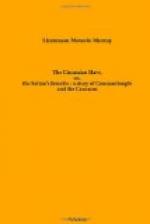At last the monarch seemed to have resolved upon some plan, whereby he hoped to relieve himself from the dilemma that so seriously annoyed him. He was most expert at disguises; indeed, it was often his custom to walk the streets of his capital incog, or to ride out unattended, in a plain citizen’s dress, as we have seen, that he might the better observe for himself those things concerning which he required accurate information. It was then nothing new for him to don the dress of an officer of the household guard; and in this costume he visited Aphiz in his cell, representing himself to be the agent of the Sultan.
“I come as an agent of the Sultan,” he said, as the turnkey introduced him to the cell.
“The Sultan is very gracious to remember’ me; what is his will?” asked the prisoner.
“He has a proposition to offer you, to which, if you accede, you are at once free to go from here.”
“And what are these terms?” asked Aphiz, with perfect coolness.
“That you instantly leave Constantinople, never again to return to it.”
“Alone?”
“Except that he will fill a purse with gold for thee to help thee on thy homeward way.”
“I shall never leave the city alone,” replied the prisoner, with firmness.
“Is that your answer?”
“As well thus perhaps as any way. I shall never leave this city without Komel.”
“But if you remain it may cost you your life,” continued the stranger.
“I do not fear death,” replied the Circassian, with the utmost coolness.
“A painful and degrading death,” suggested the agent, earnestly.
“I care not. I have faced death in too many forms to fear him in any.”
“Stubborn man!” continued the visiter, irritated in the extreme at the cool decision and dauntless bravery of the prisoner, adding, “you tempt your own fate by refusing this generous offer.”
“No fate can be worse than to be separated from her I love. If that is to be done, then welcome death; for life without her would cease to be desirable.”
“Do not be hasty in your decision.”
“I am all calmness,” was the reply.
“And shall I bear your refusal to leave the city, to the Sultan? Weigh the matter well; you can return to your native land with a purse heavy with gold, but if you remain you die.”
“You have then my plain refusal of the terms. Tell the Sultan for me,”—Aphiz in his acuteness easily penetrated the monarch’s disguise,—“tell him I thank him heartily for the generous means that he afforded me when I was poor and needy, and whereby I have been supported in his capital so long. Tell him too that I forgive him for this causeless imprisonment, and that if it be his will that I should die, because I love one who has loved me from childhood, I forgive him that also.”
“You will not reconsider this answer.”
“I am firm, and no casualty can alter my feelings, no threats can alarm me.”




